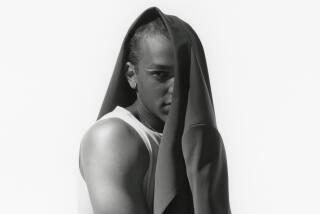‘I enjoy the money that it brings in, but it has destroyed the illusion,the magic, for me now.’
- Share via
He calls his business on Ventura Boulevard in Studio City “J.J. Wiggins, Bespoke Tailor.” Jim Wiggins is the first J; his wife, Jane, is the second, and bespoke is a custom word he brought from his homeland.
I’m a custom tailor with a flare for the arts. I started in the business as a child in London, England, at the tender age of 12. I learned out of fear, not desire, because in those days you did as you were told until you were 21 or else.
My uncle was a tailor, and it was decided that I should take up the trade. So after school at 3:30 in the afternoon I had to rush down to my uncle’s tailor shop, get there by 4 o’clock and work until 7 o’clock, every night and all day Saturday, for the grand total of five shillings. In those days five shillings was about a dollar. I’d take it home and give it to my mother, and she would give me a half a dozen pennies, and she’d put the rest away in an account for me. I could go to a couple of cowboy movies and have a bar of candy, and that was my pocket money for the week. That was the average working-class kid’s life in those days.
The war came along, so I volunteered to go into the service. I wasn’t being heroic, it was just a noble excuse to get away from being a tailor, frankly. That was 1939. I went in as a naive kid of 19 and came out at 25 a man.
I wasn’t very contented with England anymore. So I went to New Zealand for a year. The country’s beautiful, the people are charming, but at 9 o’clock at night they roll up the sidewalks. The only place open on the weekend is the church.
I came to the United States 35 years ago. It was the Hollywood you read about in the movie magazines as a kid. The big stars were still around the studios. It was a glamorous city. It’s totally different now. Anyone could arrive in Hollywood and reach fame overnight--as a young kid that was the impression. I found out very quickly that was not the case.
A lot of your small companies, such as my own along the street here, were originally with the studios. When the studios dispersed, they still had to make a livelihood, so they opened up their own little business. We send each other business. It’s a very closely knit relationship.
Show business people know what they want. They can be very demanding, but that can be challenging at the same time. It’s invariably a crazy mad rush to get things done. They’re going on camera at 8 o’clock in the morning and they don’t have a costume for the leading character. What can you do overnight for them? That’s the state of the game today. Action.
We do quite a bit of work for magicians. These are very interesting people. They are also terribly secretive as to how their garments are constructed, how they conceal what they have to. I was fitting one magician, and another magician walked in and the man I was fitting got extremely paranoid. He said, “Let’s don’t continue this fitting. Take it off and hide it, and I’ll come back later.” I enjoy the money that it brings in, but it has destroyed the illusion, the magic, for me now. When I go to see a magic show, now I know where all the stuff is coming from.
I think one has to be very shrewd in the way they operate their business. I’ve learned from bitter experiences. I’ll have a young kid come in, just starting in the business. They need a garment, they want to create a good impression, and they say, “When I make it, I’ll remember you.” Well, I’ve done that for two people who are superstars today, and they cannot remember. I could make them a garment and give it to them literally for nothing on the pretense that when they make it they’ll remember me. They make it, they do not remember. They really do not. Two people I can say that for, who will be nameless. But you’d be amazed who they are. They don’t remember those who they came to, begging for assistance.
More to Read
Sign up for Essential California
The most important California stories and recommendations in your inbox every morning.
You may occasionally receive promotional content from the Los Angeles Times.










